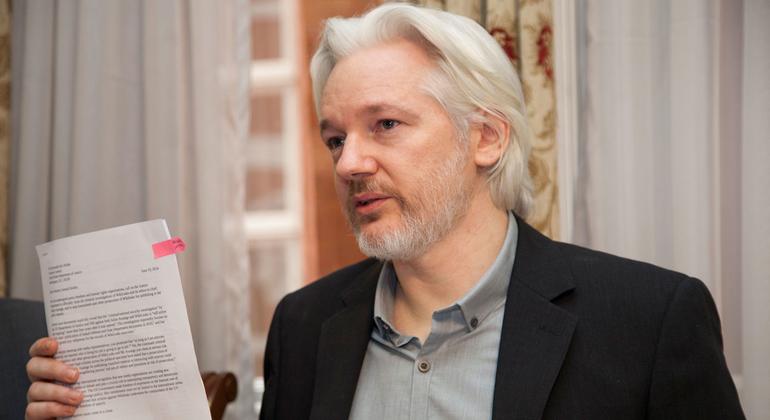Assange had been under investigation by the US Congress after a trove of classified material was leaked through the WikiLeaks platform.
“People should not, and should never, be handed over to a place where they would be subjected to torture or other cruel, inhuman or degrading treatment or punishment, including punishment that is disproportionate to the crime allegedly committed,” Alice Jill Edwards, the special rapporteur on torture and other cruel, inhuman or degrading treatment or punishment, told UN News.
“The crimes exposed by Mr. Assange must be taken seriously in the United States and appropriately investigated and prosecuted,” she said. “Impunity for war crimes and other violations of the laws of war only emboldens parties to take matters into their own hands.”
Until now, Assange had opposed extradition to the United States from a British prison following the 2010 publication of secret military documents and diplomatic communications.
The reported deal includes pleading guilty to one count of violating the US Espionage Act without facing any additional prison time.
Ukraine: ICC issues further arrest warrants for senior Russian officials
The International Criminal Court (ICC) on Tuesday issued arrest warrants for two senior Russian officials for alleged war crimes and crimes against humanity committed during Russia's full-scale invasion of Ukraine.
Both Sergei Shoigu and Valery Gerasimov held top positions in the Russian government and military at the time the reported crimes, which included missile attacks on “numerous” power plants in multiple locations, were committed.
Civilian casualties
In a statement, the court said it was “reasonable to consider that the civilian damage and losses caused by the attacks between October 2022 and March 2023 were clearly excessive in relation to the anticipated military advantage.”
The court also noted that both defendants face charges of “causing excessive accidental harm to civilians” and are responsible for “inhuman acts” by ordering the commission of crimes or “failing to properly control the forces under their command.”
UN human rights expert: Stop criminalizing homelessness and poverty
Independent United Nations human rights experts on Tuesday called on governments to repeal “cruel and counterproductive” laws that criminalize homelessness and poverty.
New research published by two UN special rapporteurs – Balakrishnan Rajagopal, the special rapporteur on adequate housing, and Olivier de Schutter, the special rapporteur on extreme poverty and human rights – documents growing evidence that homelessness and people living in poverty are increasingly being punished for simply doing what is necessary for basic survival.
This included fines and sanctions for activities such as sleeping, washing, cooking, eating, begging, and street work.
“Instead of tackling the main causes of homelessness – global housing affordability and inequality – governments are turning to outdated and vague vagrancy laws, many of which have roots in colonialism, to get people off the streets and make them disappear,” Rajagopal said.
Signs of failure
He added that homelessness is a symptom of political and social failures that have roots in policy and institutional factors.
“These laws do nothing to solve homelessness or poverty. They directly violate international human rights law and must be repealed immediately,” he said.
Research shows that criminalization only pushes desperate people into further poverty and homelessness.
“These laws create a double punishment,” De Schutter argues. “People are first punished when they are forced into homelessness, and then punished again when they are sanctioned.” [laws] These are cruel, counterproductive and disproportionate responses to the legitimate safety and public health concerns raised by homelessness.”
Abandon the punitive approach
The experts called on the government to end all bans on begging and redirect resources from policing to address the root causes of poverty and homelessness. They said the government should also end prison sentences for those who cannot afford to pay fines and promote non-custodial measures for minor homeless offences.
“Homelessness and poverty are on the rise because political choices have made a decent income and decent housing a distant dream for millions of people,” Rajagopal said. “This problem must be solved. Relying on law enforcement will not solve the problem.”
Protecting the justice system amid rising authoritarianism
In a separate report to the Human Rights Council on Tuesday, the UN's independent expert on the independence of judges and lawyers warned that the role of an independent judiciary was increasingly under attack.
Margaret Satterthwaite said some political actors were capitalizing on a climate of rising populism and authoritarianism to restrict and control the justice system, including by criminalizing prosecutors, judges and lawyers.
In his second report to the Security Council, the Special Rapporteur highlighted that Governments are trying to subvert the judiciary by suppressing bar associations, disempowering the courts and attacking those working in the judicial system at all levels.
Fundamental values at stake
“The justice system promotes and protects a fundamental value that underpins participatory governance: the rule of law,” she said. “This principle asserts that all people, including state actors, are subject to the same laws, which are applied fairly and consistently.”
“I call on member states to do more to restore public confidence in the judiciary and to protect judicial officials and their essential role in safeguarding democracy,” she added.
Special Rapporteurs and other human rights experts appointed by the UN Human Rights Council are independent of any government, do not receive remuneration for their services and act in their personal capacity.



